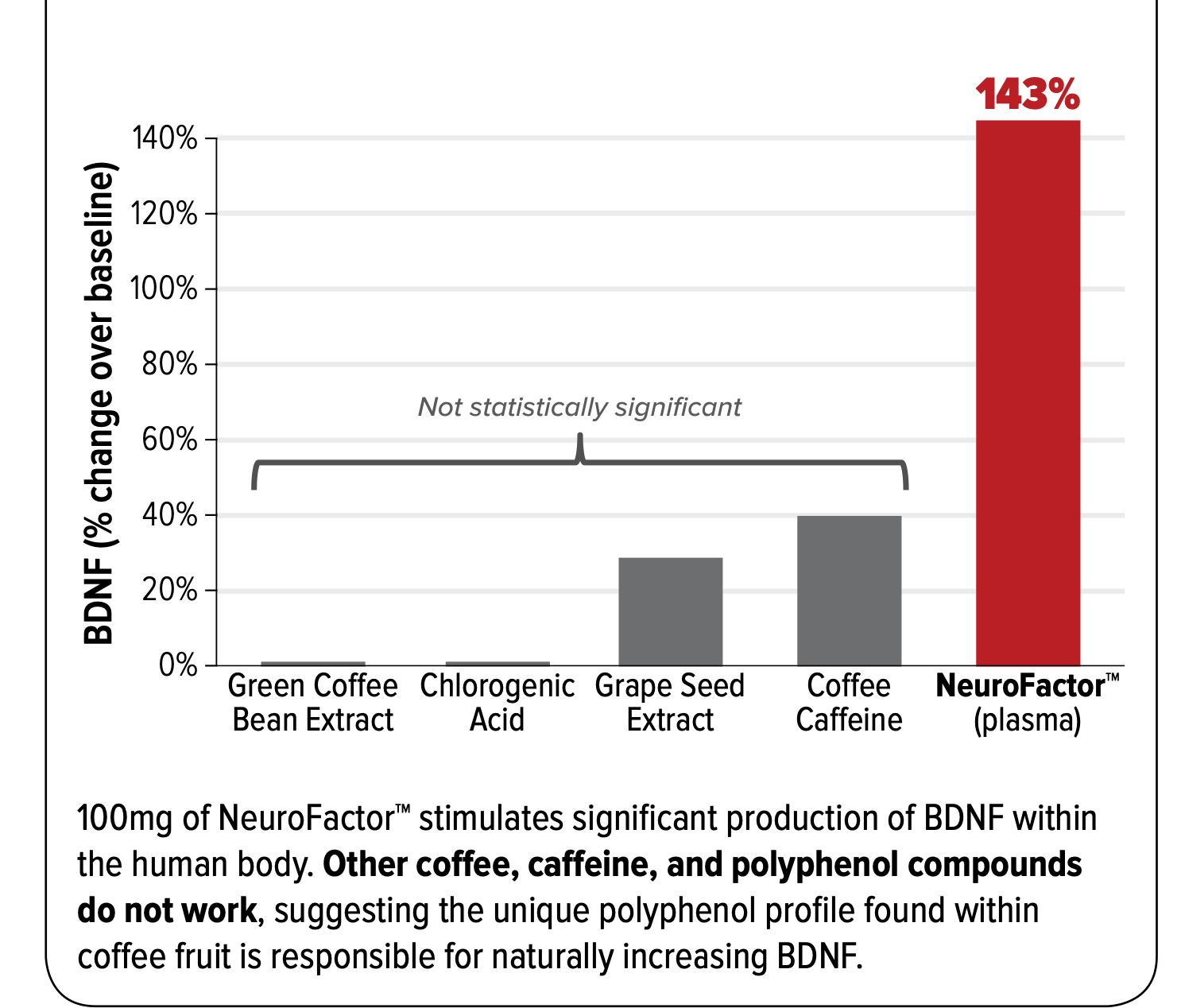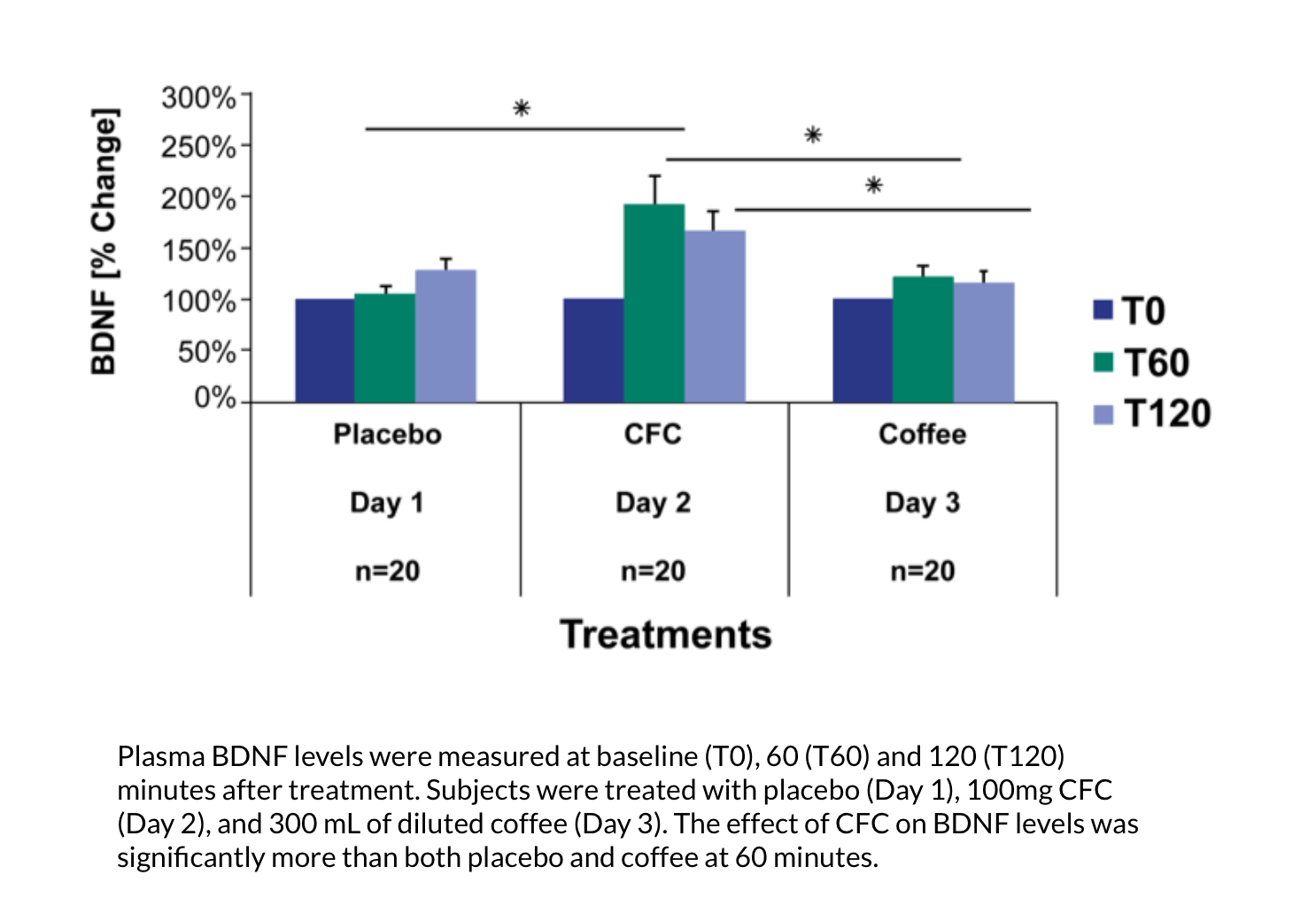
If you're like many people, you need a nice, hot cup of coffee in the morning to get your day started. One cuppa Joe can light a fire under your energy level and ignite clearer thinking. But what if you discovered that coffee holds another, even better secret for wiping away brain fog and promoting a sharp, clear memory?
We're talking about coffee fruit, a little-known part of the coffee plant with remarkable brain-boosting abilities. What's more, this forgotten fruit has given rise to the nutritional breakthrough NeuroFactor®, which can help you improve your brain performance, memory, and thinking.
Key Takeaways
-
Coffee fruit, usually discarded during coffee production, offers surprising benefits for brain health. It's rich in antioxidants and nutrients that can boost brain-derived neurotrophic factor (BDNF), a protein crucial for neuron growth, survival, and communication. This translates to improved memory, learning, and protection against cognitive decline.
-
Lifestyle modifications like exercise, quality sleep, and a healthy diet can also elevate BDNF levels. However, for those seeking a targeted approach to optimizing cognitive function and memory, there's the patented coffee fruit extract NeuroFactor®.
-
NeuroFactor® increases BDNF by 143 percent in one hour, promoting sharper thinking and enhanced memory function. It's also free from dangerous side effects, making it a safe and effective option for supporting brain health.
What is Coffee Fruit Anyway?

Coffee fruit, also known as coffee cherry or coffee berry, is the fruit of the coffee plant. Yep, coffee plants (Coffea arabica) produce fruit. This small, round stone fruit is about the size of a grape and grows in bunches on the coffee plant.
Coffee fruit is typically small and green, turning a deep red or purple shade as it ripens. What about the coffee bean?
The coffee bean we all know and love is actually the seed inside the fruit. It's true, the beans you use for brewing your morning cup of coffee are the roasted seeds of the coffee fruit. While the fruit itself is traditionally discarded during the coffee-making process, research shows that might be the most valuable part.
Coffee Fruit: The "Waste" From Coffee Roasting
The primary purpose of coffee production is to obtain the coffee beans, which are roasted and ground to make coffee. The fruit pulp surrounding the beans contains little to no caffeine and has a different flavor profile that's not typically desired in coffee.
In many coffee-producing regions, there has not been a traditional use for the coffee fruit. And because it's bulky and perishable it's usually thrown away.
However, that's changing because coffee fruit has gained attention in the nutritional health industry due to its rich content of antioxidants, polyphenols, and other nutrients that are good for the body and great for the brain. In fact, its unique nutrient profile has shown coffee fruit is far healthier than coffee when it comes to your brain.
Does Coffee Rewire Your Brain?
Coffee does affect the brain. The caffeine in coffee stimulates the central nervous system, increasing alertness and focus. It does this by blocking adenosine, a chemical that promotes sleepiness. In fact, research suggests caffeine might enhance memory and learning. Studies have shown caffeine can improve performance on cognitive tasks and aid in memory consolidation.
Some studies indicate caffeine can influence brain plasticity. This is the brain's ability to change and adapt in response to experiences.
One study showed caffeine may make some brain connections stronger in mice. However, research is ongoing, and it's unclear if this applies to humans and how long-lasting any changes might be. But when it comes to that cuppa Joe, it's not all good news.
Studies also suggest excessive caffeine intake could hinder brain plasticity. This likely depends on individual factors and dosage. For example, studies show that if you consume too many caffeinated energy drinks, all of that caffeine is bad for your brain and your heart!
Coffee Fruit and Caffeine
The biggest question we hear about coffee fruit is: Does it have caffeine? We're happy to report that coffee fruit contains significantly lower amounts of caffeine than the coffee bean.
The caffeine content of coffee fruit extract is approximately one to two percent. For example, most products containing coffee fruit extract typically contain around 5 to 20 mg of caffeine per serving, while one regular coffee contains around 96 mg of caffeine.
While coffee's main brain benefits come from caffeine, the coffee fruit provides the brain-- and body-- with a wealth of nourishment, antioxidant protection and nutrient-fueled energy.
Coffee Fruit Extract: The Hidden Gem For Clear Thinking and More

Coffee fruit extract is made only from the fruit of the coffee plant, not the beans. It contains little to no caffeine and instead is rich in antioxidants, including chlorogenic acid, rutin, and protocatechuic acid, which can protect the body against free radical damage, preventing oxidative damage to cells that causes premature aging.
Studies have shown that coffee fruit extract can:
-
Promote balanced blood pressure and heart health: Coffee fruit extract helps fight inflammation and has a positive impact on the cardiovascular system and can help your heart and blood vessels remain well-functioning.
-
Boost the immune system: Early studies have suggested that coffee fruit extract can improve immune function and activate immune cells in the lab, and can have a beneficial effect on human immune cells.
-
Support a healthy weight: Coffee fruit's chlorogenic acid content can help you maintain a healthy weight.
-
Improve cognitive function and brain health: Coffee fruit extract is linked to increased levels of brain derived neurotrophic factor (BDNF), a protein that protects brain cells from damage and improves brain function.
These brain benefits are among the most important that coffee fruit can deliver. In fact, when it comes to brain derived neurotrophic factor (BDNF), coffee fruit is one of the only nutritional compounds that can help support healthy levels. And as you're about to see, brain derived neurotrophic factor (BDNF) is critical if you want to maintain a sharp memory as you age.
The Memory Saving Power of Brain Derived Neurotrophic Factor (BDNF)

Brain derived neurotrophic factor (BDNF), or abrineurin as it's sometimes called, is a protein that's often categorized as a “neurotrophin.” This simply means it promotes the growth and survival of brain cells, or neurons.
The growth of new brain cells in a healthy brain takes place in a process called neurogenesis – under the control and direction of brain derived neurotrophic factor (BDNF). As a result, BDNF plays a crucial role in the growth, development, and maintenance of neurons (nerve cells).
For example, brain derived neurotrophic factor (BDNF) is responsible for:
-
Growing Neurons: This is essential during early development and throughout life. It aids in the formation of new connections between neurons, which are in turn crucial for learning, memory, and overall brain function.
-
Protecting Neurons: It helps brain cells resist damage and survive in challenging conditions.
-
Supporting Synaptic Plasticity: Synaptic plasticity is the brain’s ability to change and adapt. BDNF enhances existing synapses and promotes formation of new synapses... which is crucial for learning and memory.
-
Helping Brain Cells Survive: BDNF helps neurons survive by preventing programmed cell death or apoptosis. It also supports growth and maintenance of neurons.
-
Regulating Neurotransmitters: BDNF influences release and activity of neurotransmitters – the chemicals neurons use to talk to each other. It also enhances release of neurotransmitters such as serotonin and dopamine.
-
Regulating Mood: BDNF is closely linked to mood and mental health. Low levels of BDNF are linked with conditions like depression, anxiety, and other mood disorders.
In a nutshell, maintaining healthy brain derived neurotrophic factor (BDNF) levels is essential for optimal brain function and mental well-being. Unfortunately, as you age, your BDNF levels often fall. Those who can maintain them tend to have sharper, clearer memories.
Clinical Study: High BDNF Levels Linked to Sharper Memory
The Journal of the American Medical Association specialty journal JAMA Neurology published a compelling study in 2014 of more than 2,000 adults who were free from dementia at the beginning of the study. They were followed for ten years. Researchers wanted to know if people with higher brain derived neurotrophic factor (BDNF) levels were less likely to get memory loss.
And guess what? They discovered that people with higher BDNF levels were less likely to develop memory loss. BDNF was like a shield to protect their memories.
For every incremental increase in BDNF levels, dementia risk went down by a whopping 33 percent -- which is a big deal.
People in the group with the highest BDNF levels had less than half the risk of getting dementia compared to those in the lowest group. And it helped certain groups of people better than others... women, those who were 80+ years old, and those who attended college.
How to Boost Your BDNF to Super-Hero Levels

If you want to boost your brain derived neurotrophic factor (BDNF) levels, consider these steps starting today, try:
-
Consistent Intense Exercise: Exercise at 60 to 75 percent of your maximum heart rate and sustain this pace for 30 minutes to boost BDNF. This phenomenon has been confirmed by a team of scientists from around the world, including those from Stanley Center for Psychiatric Research, The Broad Institute of MIT, Harvard, Brain and Mind Research Institute and Weill Medical College of Cornell University.
-
Intermittent Fasting/Calorie Restriction: Cutting calories has long been linked to healthier aging. When it comes to BDNF levels, it may take a few months before you'll see results.
-
Cutting Refined Sugar and Saturated Fat: Eating a typical high-sugar, high-fat diet that's rick in processed foods can dampen BDNF levels. On the flip side, healthier eating can help them rise.
-
Increasing Your Vitamin D Levels: Higher vitamin D levels are linked to higher BDNF levels.
-
Getting Quality sleep: Getting enough restful sleep is vital for overall brain health and can also influence brain derived neurotrophic factor (BDNF) levels. Aim for seven to eight hours of restful sleep each night. Sleep deprivation negatively impacts BDNF levels.
-
Practicing Meditation and Mindfulness: Chronic stress can decrease BDNF. Practices like meditation and mindfulness may contribute to increased brain derived neurotrophic factor (BDNF).
-
Receiving daily sunlight: Studies reveal a coherent pattern of increasing BDNF concentrations in the spring-summer period and decreasing BDNF concentrations in the autumn-winter period. In addition, research has linked higher BDNF concentrations with a higher number of hours in the sunlight.
-
Taking the Right Supplements: Nutritional supplements such as curcumin, green tea, omega-3 fatty acids, resveratrol can support healthy BDNF levels-- as well as your overall health. But perhaps most exciting in BDNF-boosting supplementation is NeuroFactor®.
NeuroFactor® is a superior whole coffee fruit extract that's clinically proven to increase brain derived neurotrophic factor (BDNF) levels.
Why NeuroFactor®?
NeuroFactor® (sometimes called CognatiQ®) is a patented, stimulant-free natural extract derived from whole coffee fruit (Coffea arabica). Clinical evidence shows NeuroFactor® has the remarkable ability to increase BDNF levels which are essential for learning, memory, and higher thinking.
What's more, NeuroFactor® is far more effective at increasing levels of brain derived neurotrophic factor than other BDNF-boosting nutrients. Researchers believe this is due to its rich stores of antioxidant polyphenols including rutin and protocatechuic acid.
Study: NeuroFactor® Beats Other BDNF-Boosters

And perhaps even more exciting, a human study showed that NeuroFactor® increased BDNF by 143 percent in just one hour.
NeuroFactor® Increase BDNF by 143 Percent in One Hour

Neurofactor® delivers a standardized 100 mg dose—the same dose used in human studies to dramatically boost brain derived neurotrophic factor (BDNF). And that's why Green Valley Naturals formulated Brain Vitality Plus with NeuroFactor® in the same clinically studied dosage of 100 mg.
Brain Vitality Plus with NeuroFactor®
Green Valley Natural's Brain Vitality Plus with NeuroFactor® can help you support your brain's BDNF levels that decline with age.
Several studies have demonstrated that circulating BDNF levels decline with increasing age. This decline has been associated with smaller hippocampal volumes and poorer memory performance in older adults.
When you choose a healthy lifestyle and Brain Vitality Plus you can do your part to help keep your thinking sharp and clear for years to come.
Summary
Coffee fruit, the often discarded part of the coffee plant, offers surprising benefits for cognitive function and memory. Packed with antioxidants and unique nutrients, it holds the key to boosting brain derived neurotrophic factor (BDNF), a protein crucial for neuron growth, survival, and communication. While various lifestyle changes like exercise, diet and quality sleep can elevate BDNF, NeuroFactor®, a patented coffee fruit extract in Brain Vitality Plus, offers a potent and clinically proven solution. It effectively raises BDNF levels, promoting sharper thinking and enhanced memory function. So, consider ditching the extra cup of coffee and exploring the remarkable potential of coffee fruit for a healthier, sharper mind.
Frequently Asked Questions
What is NeuroFactor®?
NeuroFactor® (sometimes called CognatiQ®) is a patented, stimulant-free natural extract derived from whole coffee fruit (Coffea arabica). Clinical evidence shows NeuroFactor® has the remarkable ability to increase BDNF levels which are essential for learning, memory, and higher thinking. NeuroFactor® (as CognatiQ®) was awarded “Ingredient of the Year” in the Cognitive Function Category for the 2023 NutraIngrediensts-USA Awards and is the 2023 Nutrition Industry Executive (NIE) New Ingredient Awards Winner in the Condition Specific category.
What does NeuroFactor® do?
NeuroFactor® increases levels of brain derived neurotrophic factor (BDNF) by 143 percent in just one hour. Researchers believe its effectiveness is due to its rich stores of antioxidant polyphenols including rutin and protocatechuic acid. Increased BDNF strengthens brain cells to ensure their survival, enhances the ability of brain cells to talk with each other by improving the formation of synapses, and induces the growth of new brain cells.
What are the benefits of taking NeuroFactor®
NeuroFactor® supports clear thinking, sharp memory and strong cognitive function by helping your body naturally increase levels of brain derived neurotrophic factor (BDNF). This is responsible for growing and protecting brain cells which are crucial for learning, memory and overall brain function. It also helps the brain's plasticity-- its natural ability to change and adapt-- as well as supports healthy neurotransmitter balance which is closely linked to mood and mental health.
Are there any side effects associated with taking NeuroFactor®
NeuroFactor® is clinically proven to be safe and free from dangerous side effects. In general, coffee fruit concentrate products or coffee fruit extract products manufactured adhering to the highest standards of quality and purity are safe and side effect free. Speaking of quality, NeuroFactor® (also known as CognatiQ®) was awarded “Ingredient of the Year” in the Cognitive Function Category for the 2023 NutraIngrediensts-USA Awards and is the 2023 Nutrition Industry Executive (NIE) New Ingredient Awards Winner in the Condition Specific category.
NeuroFactor® . Futureceuticals. https://www.futureceuticals.com/neurofactor
Robinson JL, Yanes JA, Reid MA, Murphy JE, Busler JN, Mumford PW, Young KC, Pietrzkowski ZJ, Nemzer BV, Hunter JM, Beck DT. Neurophysiological Effects of Whole Coffee Cherry Extract in Older Adults with Subjective Cognitive Impairment: A Randomized, Double-Blind, Placebo-Controlled, Cross-Over Pilot Study. Antioxidants (Basel). 2021 Jan 20;10(2):144. doi: 10.3390/antiox10020144. PMID: 33498314; PMCID: PMC7909261. https://pubmed.ncbi.nlm.nih.gov/33498314/
Erickson KI, Prakash RS, Voss MW, Chaddock L, Heo S, McLaren M, Pence BD, Martin SA, Vieira VJ, Woods JA, McAuley E, Kramer AF. Brain-derived neurotrophic factor is associated with age-related decline in hippocampal volume. J Neurosci. 2010 Apr 14;30(15):5368-75. doi: 10.1523/JNEUROSCI.6251-09.2010. PMID: 20392958; PMCID: PMC3069644. https://pubmed.ncbi.nlm.nih.gov/20392958/
Jackson PA, Kenney C, Forster J, Smith EF, Elcoate R, Spittlehouse B, Johnson J, Kennedy DO. Acute Cognitive Performance and Mood Effects of Coffeeberry Extract: A Randomized, Double Blind, Placebo-Controlled Crossover Study in Healthy Humans. Nutrients. 2023 May 23;15(11):2418. doi: 10.3390/nu15112418. PMID: 37299382; PMCID: PMC10254646. https://pubmed.ncbi.nlm.nih.gov/37299382/
Erickson KI, Voss MW, Prakash RS, Basak C, Szabo A, Chaddock L, Kim JS, Heo S, Alves H, White SM, Wojcicki TR, Mailey E, Vieira VJ, Martin SA, Pence BD, Woods JA, McAuley E, Kramer AF. Exercise training increases size of hippocampus and improves memory. Proc Natl Acad Sci U S A. 2011 Feb 15;108(7):3017-22. doi: 10.1073/pnas.1015950108. Epub 2011 Jan 31. PMID: 21282661; PMCID: PMC3041121. http://www.ncbi.nlm.nih.gov/pubmed/21282661
Mattson MP. Energy intake, meal frequency, and health: a neurobiological perspective. Annu Rev Nutr. 2005;25:237-60. doi: 10.1146/annurev.nutr.25.050304.092526. PMID: 16011467. http://www.ncbi.nlm.nih.gov/pubmed/16011467
Molteni R, Barnard RJ, Ying Z, Roberts CK, Gómez-Pinilla F. A high-fat, refined sugar diet reduces hippocampal brain-derived neurotrophic factor, neuronal plasticity, and learning. Neuroscience. 2002;112(4):803-14. doi: 10.1016/s0306-4522(02)00123-9. PMID: 12088740. http://www.ncbi.nlm.nih.gov/pubmed/12088740
Molendijk ML, Haffmans JP, Bus BA, Spinhoven P, Penninx BW, Prickaerts J, Oude Voshaar RC, Elzinga BM. Serum BDNF concentrations show strong seasonal variation and correlations with the amount of ambient sunlight. PLoS One. 2012;7(11):e48046. doi: 10.1371/journal.pone.0048046. Epub 2012 Nov 2. PMID: 23133609; PMCID: PMC3487856. http://www.ncbi.nlm.nih.gov/pmc/articles/PMC3487856/
Liu D, Wang Z, Gao Z, Xie K, Zhang Q, Jiang H, Pang Q. Effects of curcumin on learning and memory deficits, BDNF, and ERK protein expression in rats exposed to chronic unpredictable stress. Behav Brain Res. 2014 Sep 1;271:116-21. doi: 10.1016/j.bbr.2014.05.068. Epub 2014 Jun 8. PMID: 24914461. http://www.ncbi.nlm.nih.gov/pubmed/24914461
Nam SM, Choi JH, Yoo DY, Kim W, Jung HY, Kim JW, Yoo M, Lee S, Kim CJ, Yoon YS, Hwang IK. Effects of curcumin (Curcuma longa) on learning and spatial memory as well as cell proliferation and neuroblast differentiation in adult and aged mice by upregulating brain-derived neurotrophic factor and CREB signaling. J Med Food. 2014 Jun;17(6):641-9. doi: 10.1089/jmf.2013.2965. Epub 2014 Apr 8. PMID: 24712702; PMCID: PMC4060834. http://www.ncbi.nlm.nih.gov/pubmed/24712702
Gundimeda U, McNeill TH, Fan TK, Deng R, Rayudu D, Chen Z, Cadenas E, Gopalakrishna R. Green tea catechins potentiate the neuritogenic action of brain-derived neurotrophic factor: role of 67-kDa laminin receptor and hydrogen peroxide. Biochem Biophys Res Commun. 2014 Feb 28;445(1):218-24. doi: 10.1016/j.bbrc.2014.01.166. Epub 2014 Feb 4. PMID: 24508265. http://www.ncbi.nlm.nih.gov/pubmed/24508265
Wu A, Ying Z, Gomez-Pinilla F. Dietary omega-3 fatty acids normalize BDNF levels, reduce oxidative damage, and counteract learning disability after traumatic brain injury in rats. J Neurotrauma. 2004 Oct;21(10):1457-67. doi: 10.1089/neu.2004.21.1457. PMID: 15672635. http://www.ncbi.nlm.nih.gov/pubmed/15672635
Rahvar M, Nikseresht M, Shafiee SM, Naghibalhossaini F, Rasti M, Panjehshahin MR, Owji AA. Effect of oral resveratrol on the BDNF gene expression in the hippocampus of the rat brain. Neurochem Res. 2011 May;36(5):761-5. doi: 10.1007/s11064-010-0396-8. Epub 2011 Jan 9. PMID: 21221775. http://www.ncbi.nlm.nih.gov/pubmed/21221775
